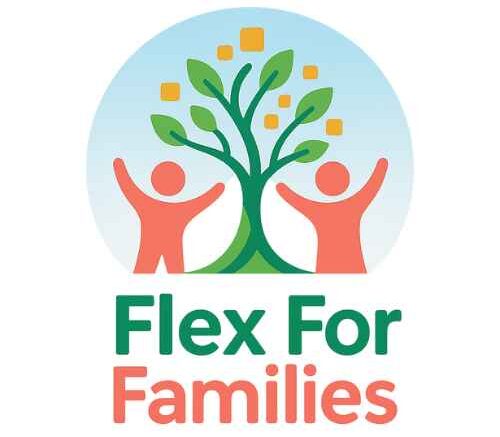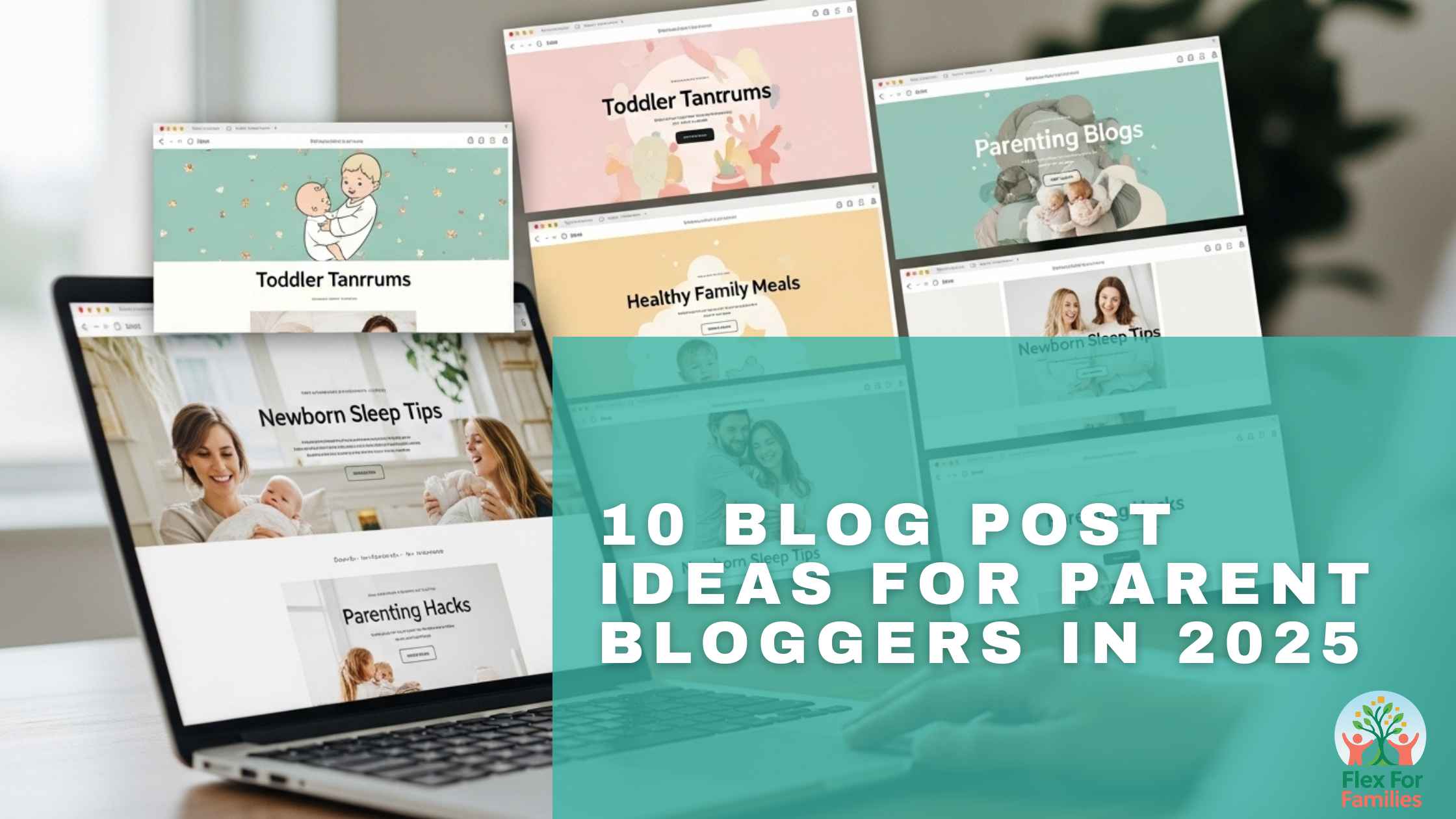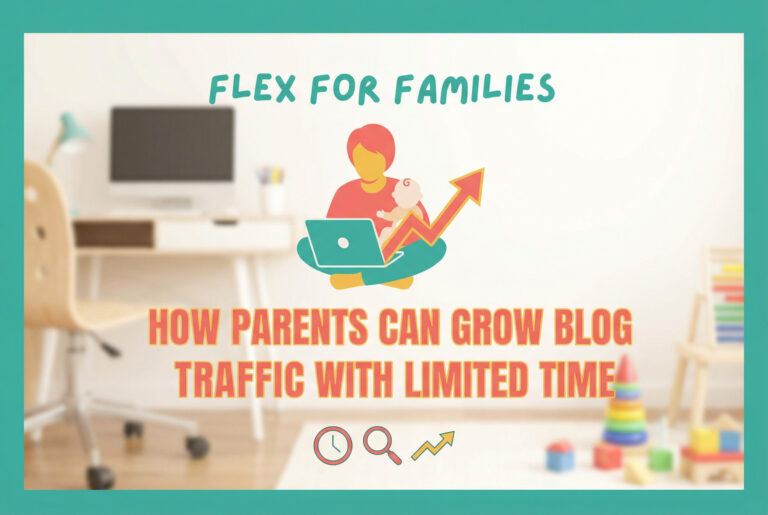Every blogger hits that blank-page moment… The one where you sit down with coffee, open a new draft, and suddenly forget every idea you’ve ever had. When you’re balancing family life, work, and a blog, creativity can feel like just another thing on the to-do list.
That’s exactly why I put together this list of blog post ideas made for parents like us. Each one fits around real life; the school runs, the naptimes, and the never-ending laundry piles. All Whilst helping you grow your audience and stay consistent.
If you’re just starting out or trying to rebuild momentum, this post pairs perfectly with How To Grow Blog Traffic As A Busy Parent (Without Burning Out) and From Naptime To New Blog: 10 Essential Tips For New Parent Bloggers.
There are plenty of general blogging idea lists out there – like HubSpot’s extensive roundup of blog post ideas – but most of them don’t consider how family life actually shapes creativity. These 10 ideas are designed with parent bloggers in mind, where nap schedules and snack times matter just as much as SEO.
Ready to get inspired? Here are 10 post ideas that will help you build confidence, connect with readers, and keep your blog feeling fresh all year long.
1. Share “A Day in the Life” of Your Family Routine
Readers love authentic glimpses into what real family life looks like; the funny, messy, and meaningful moments that make your story unique.

You could write a post titled:
“A Day in the Life of a Work-From-Home Parent Blogger” or
“Our Morning Routine (and How I Actually Get Blog Work Done).”
These types of posts build connections fast because they show the real human behind the blog. Don’t worry about making it perfect; readers relate to the chaos more than the calm.
If you’ve ever struggled with energy or motivation during the week, you might also enjoy my post on Managing Parent Burnout: Self-Care Routines for Blogging Moms and Dads.
2. Write a “Lessons Learned” Post from Your Parenting Journey
These are the posts that resonate on a deeper level. They show growth, honesty, and vulnerability. You could focus on lessons about patience, balance, or even creative confidence.

A few ideas to spark inspiration:
- “5 Things My Toddler Taught Me About Blogging Consistency”
- “What Parenting Has Taught Me About Building an Online Business”
- “Why Slower Progress Is Still Success.”
Honest storytelling builds trust, and that’s what keeps readers coming back.
If you’re still working on your blogging confidence, you might find encouragement in 5 Ways to Build Blogging Confidence as a New Parent Blogger. (needs link adding)
3. Share Easy, Real-Life Productivity Tips
Every parent blogger knows time management isn’t about discipline; it’s about flexibility.

This post idea could become something like:
“How I Stay Productive as a Parent Blogger (Even When Plans Change)” or
“Simple Time-Blocking Tricks That Work for Family Life.”
Focus on routines that bend with family life, like batching small tasks during nap time or setting “blogging hours” after bedtime. These relatable tips help readers feel seen and supported, not pressured.
If you’d like to see how I structure productivity around real-life routines, check out How To Create a Content Calendar That Works for Family Life.
Join us to stay consistent, get inspired, and finally hit publish — without the pressure.
4. Write “How-To” Tutorials for Other Parent Bloggers
Tutorial posts are powerful because they show how you do something… Not just what you do.

You could share quick guides like:
- “How I Use Canva To Design Blog Images in Under 10 Minutes”
- “How I Schedule Pinterest Posts Using Tailwind”
- “How I Use Affiliate Links Without Feeling Salesy.”
These posts build authority and help fellow parents learn through your experience (not theory).
If you’ve never shared a walkthrough before, start with tools you already use every week. For example, my Canva for Beginners (2025 Review) post breaks down the exact steps I use to create branded blog graphics fast – even during nap time.
Or, if Pinterest is part of your strategy, you can peek at my Tailwind Review 2025 to see how I automate pin scheduling and keep traffic steady while focusing on family life.
5. Write Honest Product or Course Reviews
Parent bloggers build trust through honesty – not hype. Share what actually worked (and what didn’t), including lessons learned along the way.

Example titles:
- “My Honest Review of a Blogging Course That Actually Helped”
- “What I Learned From Testing 3 Affiliate Programs.”
These posts attract search traffic and show readers you’re genuine about helping them make smart decisions.
If you’re not sure where to begin, start by reviewing something you’ve actually tried, even if it’s free. My Making Sense of Affiliate Marketing Review is a good example of how to keep things transparent and parent-friendly without sounding salesy.
And if you want to see how a platform like Wealthy Affiliate supports new bloggers with community and training, my Wealthy Affiliate Review 2025 walks through that experience step-by-step.
6. Share a “Behind-the-Scenes” of Your Blog Setup
Readers love transparency… Show them how you built your blog, what tools you use, and how you stay organised.

These posts also perform well on Pinterest because they’re visual and process-based.
Possible titles:
- “My Home Office Setup as a Parent Blogger”
- “The Tools I Use to Run My Blog (and Keep My Sanity).”
For inspiration, I’ve shared exactly how I set up my own blog in How To Choose The Perfect Blog Theme For Your Family Brand. You’ll also find my go-to resources in the Parent Blogging Toolkit. Packed with beginner-friendly tools like Bluehost and Canva that make running a parent blog simpler and smoother.
Join us to stay consistent, get inspired, and finally hit publish — without the pressure.
7. Share Family Finance or Budget-Friendly Blogging Tips
This content does double duty. It’s relatable for parents and valuable for affiliate monetisation.

Ideas include:
- “How to Blog on a Budget as a Stay-at-Home Parent”
- “Affordable Tools That Help Me Run My Blog Smoothly.”
- “How Blogging Helped Our Family Budget.”
Pair financial transparency with practical tips. Readers love it when you show that it’s possible to grow a blog without overspending.
If you’d like some practical examples of balancing money and blogging, my post Monetisation Made Simple covers beginner-friendly ways to earn without stretching the family budget. You can also look at Affiliate Marketing for Parents for ideas on promoting products you already use, or my Amazon Associates for Parents guide for quick, family-friendly affiliate examples.
8. Write About Self-Care, Balance, and Mental Load
Blogging while parenting isn’t just about finding time… It’s about managing your energy, emotions, and expectations. Posts about self-care, mental health, or family balance resonate deeply because every parent feels the weight of juggling it all.

Possible angles:
- “How I Find Balance Between Blogging and Family Life”
- “Why Taking Breaks Actually Makes You a Better Blogger”
- “What I Do When the Mental Load Feels Too Heavy.”
Encourage readers to rest, reset, and redefine success on their own terms.
I share more on this topic in Parent Inspiration Stories – stories from real parents who found balance while building blogs. And if you’re ever feeling stuck between burnout and motivation, Managing Parent Burnout offers a few gentle self-care routines that have helped me reset on tough weeks.
9. Spotlight Other Parent Bloggers or Feature Guest Stories
Featuring other parents adds diversity and builds instant community.

You can highlight bloggers who inspire you, interview them, or create roundup-style posts like:
- “10 Parent Bloggers Who Inspire Me in 2025”
- “How Other Parents Balance Blogging and Family Life.”
These are highly shareable, help build backlinks, and show readers you value collaboration over competition.
If you’d like a little inspiration before reaching out, check out my Top 10 Types of Parent Blogs You Should Follow post. It’s packed with ideas for the kinds of voices and niches that resonate. You can also look at Understanding Different Parenting Styles Through Blogs for examples of how different perspectives can add real depth to your content.
10. Write a Year-End Reflection or Goal Setting Post
Readers love honest reflection; what went well, what flopped, and what you’re planning next. Posts like these build transparency and connection while naturally inviting comments and conversation.

Try:
- “What I Learned from My First Year of Parent Blogging”
- “My Blogging Goals for 2025 (And What I’m Letting Go Of).”
When you’re ready to set new blogging goals, Time-Blocking Routines for Stay-At-Home Parent Bloggers shows how I plan my weeks around family life. If you want to grow your blog strategically in the new year, Parent-Friendly SEO and How To Start Affiliate Marketing As a Busy Parent make great companion reads to help your reflections turn into action.
Mini FAQ: Choosing the Right Idea for Your Family Blog
How do I know which idea to start with?
Go with the one that feels easiest or most fun to write right now. The goal is to build momentum – not perfection. Once you hit publish, the next post always comes easier.
How often should I post new content?
Whatever rhythm fits your current season of life. Some parents post weekly, others monthly. Consistency means showing up when you can, not following someone else’s schedule.
Can I mix parenting stories with blogging advice?
Absolutely. That mix of real-life and creativity is what makes your voice stand out. The most engaging parent blogs are the ones that blend both honestly.
And if you’d like a few extra brainstorming prompts, Blogging Wizard’s guide to blog post ideas is another great resource for inspiration. Just remember to keep yours rooted in your real-life family stories – that’s what makes parent blogs so powerful.
If you’re not sure how to turn an idea into a full post, the Parent Blogging Hub has planning templates and prompts that can help you shape your stories into something you’re proud to share.
Conclusion: Turning Ideas Into Action
Coming up with blog ideas is exciting… But the real magic happens when you take one and bring it to life. Each of these topics has the power to connect you with readers who are walking through the same ups and downs of parent life.
Whether it’s a story about balance, a behind-the-scenes look at your blog setup, or a lesson learned during nap time, your voice matters. Every post adds to the bigger story of what it means to build something flexible, family-first, and uniquely yours.
Start small, write often, and keep learning as you go. You’ll be amazed at how much you can grow, one post (and one nap) at a time.
Join us for feedback, accountability, and encouragement that fits around real family life.




